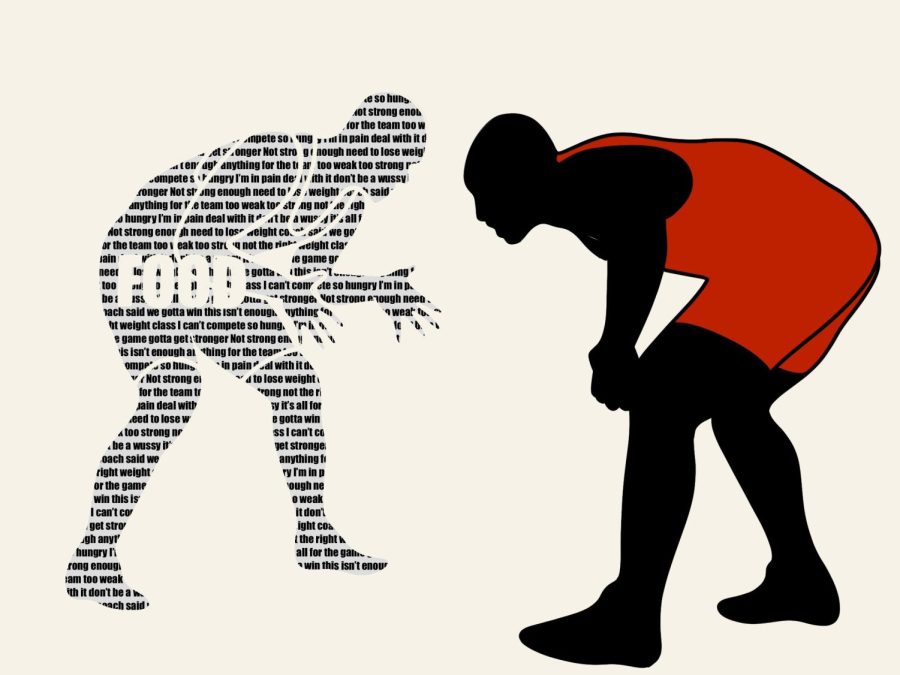Wrestling With Weight
The hidden aspects of Troy High School’s wrestling team.
Graphic Illustration of two wrestlers. The wrestler on the right wears a red singlet. The wrestler on the left is made up of words that represent wrestler insecurities.
The Troy High School wrestling team practices in the winter sports season. As part of their preparations for the upcoming season, wrestlers adapt new eating habits, choosing to either “bulk” or “cut” before the season starts. This is done to either gain enough mass to tone into muscle later or to begin the toning process earlier. Bulking consists of consuming a caloric surplus, including increased carbohydrates and low fat foods, while doing high-intensity training to gain muscle mass. Wrestlers cut weight by restricting their food and water intake to quickly lose as much weight as possible before competitions in order to fit into their ideal weight class.
Junior Jesse Chang, who has been on the wrestling team for one year, describes how he approaches each season:
“Usually you want to [bulk] before the season starts so you can cut weight during the season,” Chang said. Wrestlers bulk and cut weight in order to fit into specific weight classes, which determine who they will wrestle in matches. In the State of Michigan, there are 14 weight classes officially recognized by the Michigan High School Athletic Association.
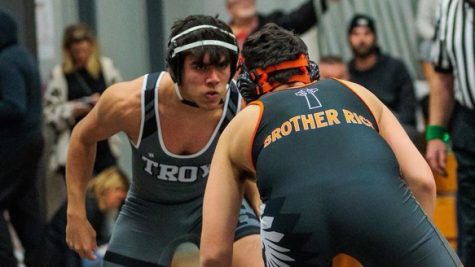
According to ESPN News, “To try and fit into a lower weight category, athletes ‘cut’ weight — up to 10 percent of their body mass — in the couple of weeks before an event. The last 24 hours before the weigh-in is especially traumatic, as they try to squeeze out each gram of excess weight. After ‘making weight’ on the morning of their competition, they’ll then try to recover that mass, usually by replacing fluids lost in the process.” This allows for wrestlers to be in a lower weight class match but be physically stronger than their opponent.
Senior James Awad, who has been on the wrestling team for four years, explains why this gives wrestlers another advantage. “The lighter you are, the faster you are,” he said. “I’m a 270-pound male, if I go up against another person who’s also my weight, but I’m a lot skinnier than him, or more compact, I’ll be faster, or be able to take him down more easily.”
Having organized weight classes is important for wrestlers to stay safe during their competitions, as a lightweight wrestler risks significant injury in a match against a heavyweight wrestler versus a match against someone of their own weight class. However, it’s become common practice for a wrestler to gain or lose weight to fit into certain weight classes that are not their own. This could lead to altered eating habits that will remain for the rest of the season, or, potentially, the rest of the year.
Junior Landon Shamoun has been wrestling for six years, three of those years with the Troy High School team. When asked if he felt any external pressure to lose weight, Shamoun replied: “No, I feel like that’s what we need to do. It’s what Coach expects of us, it’s what the rest of us want to do. We want to work hard.” He added, “We’re always expected to lose a bit of weight.”
Dan Mastrovito, the assistant wrestling coach, has been a part of the wrestling team, on-and-off, for 29 years. He provides insight on what the physical expectations are: “It’s probably the most difficult sport for training. Our [head] coach is an ex-Marine and our conditioning, preseason practices, are pretty rough. I’ve seen other coaches and [these are] the most physically challenging practices I’ve ever been a part of.”
Shamoun adds, “Everyone wants to work hard, and our coach pushes us hard. Very hard.”
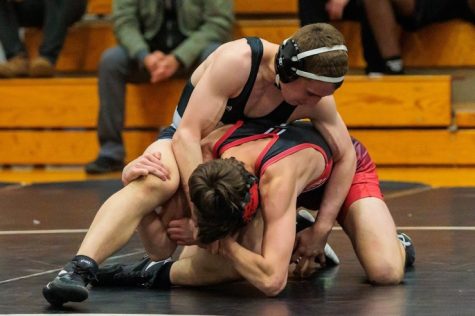
According to the Children’s Hospital Colorado, “An estimated 25% to 67% of wrestlers use techniques such as over exercise, calorie restriction, fasting and different dehydration methods to lose weight.”
Denene Smyth, a pediatric-subspecialist registered dietician at the Children’s Hospital of Michigan, warns against these methods of dramatic weight loss: “High school boys are still growing. Their brain[s] are still developing, their bones are still developing, their muscles are still developing. It is not a good idea to be cutting out and to be in that huge of a calorie deficit—it’s a vitamin and mineral deficit as well.” She emphasizes, “Bodies need what they need. And doing this ‘yo-yo’ intake is not going to help their metabolism. It’s not going to help nourish their brain.”
Smyth also does not agree with the idea of adjusting a wrestler’s diet to fit into a certain weight class,“The vitamins and minerals that you’re missing out by just doing proteins or carbs and other really calorie-dense foods, you’re not going to reap the benefits of all the vitamins that you’re going to get from a well balanced diet,” Smyth adds. “So, I do think that it is not in their best interest to do that. You should definitely have your fruits and vegetables: a whole, balanced plate.”
The Troy High School wrestling team does appear to be aware of the potential health risks associated with cutting and bulking weight and has been taking action to prevent negative health consequences for the wrestlers. In the past, it was common practice for coaches to let wrestlers’ choices of weight loss methods go unchecked, or even recommend harmful practices to wrestlers, and let their health decline for the sake of the sport.
Senior Avi Shah, who has been wrestling for eight years and has been on the Troy High School team for four years, discusses how wrestlers historically achieved their desired weight classes. “[In the] ‘80s, people would just dehydrate themselves in saunas, they wouldn’t eat for days, just chew gum,” Shah said. “It was super unhealthy, people would literally pass out and die because they’re trying to get into a certain weight class.”
Currently, Troy High School wrestlers are encouraged to take better care of their health by their coaches, who give them safer guidelines for their diets. Members of the wrestling team share their experiences with these guidelines.
“The coach is like, ‘You need to lose weight, but I don’t want you to kill yourself,’ meaning you don’t eat any meals,” Chang said. “He still wants you to eat all your meals, eat healthy, eat until you’re full, but just don’t eat any of the meals that might make you gain weight.” Other members of the wrestling team shared similar sentiments about avoiding specific foods.
Shah summarizes what foods wrestlers at Troy High School are told to eat or avoid:
“A lot of protein, fruits and veggies; you literally can’t have McDonald’s, fast food. Anything that’s remotely sugary, like candy, soda, all gets cut out.”
Shamoun also shares some of the advice he has been given: “During the season, Coach tells us ‘no Coke, nothing bad, eat well: eat greens, eat meat. Pop is poison.’” Shamoun then goes on to refer to sugar-filled foods as the “bad stuff.” He continues to describe what the coach tells the team, “‘Don’t go guzzling water, and eating tons of food every night.’ We always gain a lot of water weight after practice.”
Awad clarifies that coaches do not encourage harmful eating habits, “They have strict rules on how much you can weigh by a certain practice. If you weigh less or more, you can’t wrestle. It used to be very dangerous and wrestling is known for people having anorexia, so it is very dangerous.” He adds, “We try to keep it as safe as possible, and all our coaches encourage losing weight but they don’t encourage being idiotic and stupid and hurting yourself, because that’s just wrong.”
While wrestling coaches do give team members a general idea of how to eat and make weight during wrestling season, ultimately, the choice is up to the wrestlers themselves.
Senior Riley Marbutt, who has been on the wrestling team for one year, describes the process of determining weight classes before the season starts, “They give you the numbers and they ask you where you want to be, or where they think you should be at or should be able to make.” She emphasizes, “You decide for yourself whether you make it there or not.”
Shah shares his personal dietary choices: “A lot of people don’t eat breakfast. I eat breakfast because I think that it’s important to start off the day with something in your stomach.”
Shamoun added that he continues with a semi-restrictive diet during the off-season, “In season, I try to keep some of the heavier foods, some of the worse, a lot more down. Off-season, I still wrestle, I still try to eat moderately healthy but some things are allowed more often [compared to] in-season.”
In recent years, the State of Michigan has implemented Alpha weigh-ins, also referred to as Alpha testing. This is a procedure done at the beginning of the wrestling season to ensure that wrestlers are meeting their weight groups in a safe manner. Alpha weigh-ins measure whether or not a wrestler is properly hydrated before a match, ensuring that wrestlers have not been abstaining from water to meet a certain weight class. Dehydration could lead to low blood pressure and dizziness.
“[Wrestlers] weigh in with the state, they measure their body fat, they make sure they are hydrated, and then the state tells us the lowest weight class they can go, rather than us [coaches] telling them,” Mastrovito explained. Wrestlers are required to submit a urine sample for officials to check their hydration levels and do a weigh-in to make sure they aren’t losing weight too sporadically or dangerously.
“Before there was Alpha testing, Coach told us a story a while ago where if your coach told you to go a certain weight class, you went a certain weight class,” Shamoun shared. “If that meant wearing trash bags on your body and burning yourself out everyday, then, back then, you had to do it. That actually killed a person once. So, to make sure that didn’t happen, we got this test. It’s to make sure that you’re within ten pounds of what you weighed a certain amount of time ago.”
The incident Shamoun refers to did not occur at Troy High School, but at another school within the state. Troy High School has worked towards finding safer solutions for weight loss in the wrestling program as a result of the death.
Mastrovito clarifies, “There’s other teams that do a lot of crazy stuff for [weight classes], but again, with the Alpha weigh-in, they can’t go too low.”
However, despite the coaches’ and the state’s efforts to prioritize the health of the wrestlers, some still believe that there is further room for change. Smyth expressed dissatisfaction with the current dietary recommendations, stating, “I definitely think coaches are misguided a lot of times. They don’t really know.” She continues, “It would be really nice if they could utilize the resources of the community, dietitians like myself.”
Smyth details her ideal meal for student athletes: “Every kid recognizes it when I pull out my ‘Choose My Plate,” she said, “Making sure of those vitamins and minerals and fiber intake from the fruits and vegetables, half of your diet coming from that, there’s really true science behind that.” She clarifies that, while not every meal needs to be a perfectly balanced spread, the total food intake for the day should include everything from a classic healthy plate diagram.
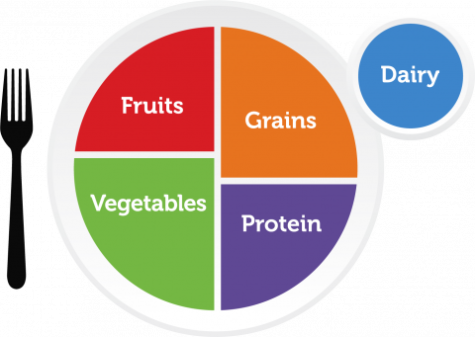
“The night before, try to eat higher performance foods, like complex carbohydrates and proteins, before [the match],” Smyth continued. “And then after the event, high-protein within 30 minutes. But still, your day should fit into that ‘Choose My Plate,’ it still should be balanced.” She lists lean proteins, such as chicken breast, turkey breast, beans and eggs, as well as whole grains such as whole wheat bread and brown rice as healthier choices than traditional carb-loading foods. “Things that are going to give you fuel and stay in your body more than when you go with the white rice, white pasta, and all that stuff.”
Awad shares that the safety regulations for the wrestling team are continuing to develop and have developed significantly from years before, “Every year it’s changed [that] I’ve been wrestling.” He recalls the experiences of former students on the team, “I remember my brother, he was also a heavyweight [wrestler], they used to take a sip of water, twist it in their mouth and spit it out so they wouldn’t gain the water weight. Very unhealthy. You need water in your system to keep moving, but some of these kids were very focused on losing weight.” The Alpha weigh-in system now works to prevent wrestlers from dehydrating themselves.
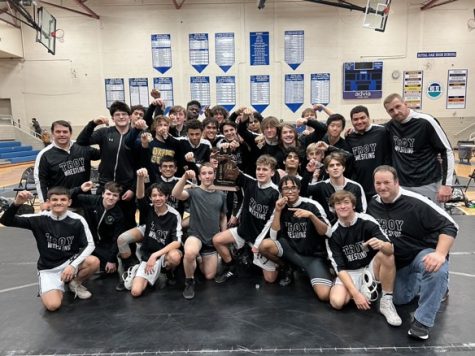
Awad clarifies that the wrestling team has impacted him positively in certain ways, “There’s one promise my coach makes at the beginning of every season and every informational meeting you will ever attend: wrestling will make you a better person.” He adds, “Doesn’t matter who you are. If you attend, put your all into it, do what you’re supposed to, you’ll come out of that four-five month season a better person.”
Shah shares a similar sentiment and reiterates the wrestling team’s aspirations to improve: “We all have our disagreements at times, but we all care for each other, we all have the same motivations to make this team a better team.”
With the wrestling team taking the initiative to protect the safety of their student athletes, Smyth hopes this will extend to changing perceptions of diet and weight amongst wrestlers.
Your donation will support the student journalists of Troy High School - MI. Your contribution will allow us to print our work, purchase equipment and cover our annual website hosting costs.





